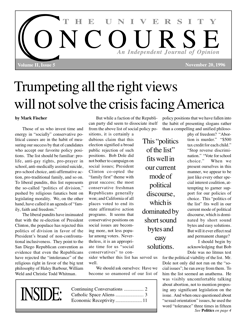Et tu, Regina?
by Michael Welker
Regina Schmiedicke’s article in the October 16 issue of the Concourse reminding us, once again, of the downsides(!) of capitalism includes some serious errors. However sincere she may be in her interest in the topic, she demonstrates little practical knowledge of economic theory and also fails to establish her opinions on the basis of the facts.
First of all, a clarification: we should note that while the Church has always denounced the grave social injustices perpetuated by unbridled (a.k.a. laissez-faire) capitalism, she has likewise forcefully condemned the still graver moral injustices occurring under the other systems of material organization. No system of social and material order is perfectly free from error or invulnerable to abuse. But I suggest that free-enterprise, properly subsumed beneath culture and morality, not only can be humane, but is more conducive to humanity than any other system known to man.
When the Church proposes principles such as subsidiary and solidarity, they are meant to be taken as moral guidance which can help us in making decisions about the proper functioning of the system. However, it is imperative to recall that the system takes on the form we give it; its “success” (in terms of being good for humanity) depends on our exercising our freedom in morally responsible ways. We cannot change the system from the top to the bottom, as if it were some kind of machine or device that, when it is out of whack, can be adjusted and tweaked to generate the result we want or intend. The attempts by communist and socialist theorists (as well as our own federal government officials) to do this adjusting have resulted in disaster. The idea that a gifted few can organize and control the economy for the welfare of society as a whole has proved a “fatal conceit.” This is a term I borrow from the Austrian economists, who are champions of freedom in the economic order. They point to the inherent impossibility of knowing what everyone wants and needs (or telling everyone what they want and need, in its much more diabolical form) at any point in time.
The best method is to start at the bottom (this is the true meaning of subsidiarity), that is, at the level of moral persuasion, education on economic literacy and our Christian heritage, and personal conversion. The result of such action, I propose, will be an evolving and widening moral order working itself into the fabric of our regular workaday existence.
Second, to rectify some errors: Regina states, rightly enough, that capitalism without restraints is essentially competitive. But she then proceeds to describe the centralization of management power over society’s resources, as if the mega-corporation is the necessary result of competitive processes. In essence, this is a watered-down version of the dialectal materialism popularized by Marx—a theory of economic activity which is totally out of touch with the facts.
Her argument fails to properly survey business demographics as well as the public policies and laws which effectively restrain the growth of such mega-corporations. In addition, a broader view of historical and current trends gives evidence that competition is heightening in the global marketplace and that corporate down-sizing and right-sizing is becoming more typical. Consider, too, the dramatic growth of small businesses especially between 1986 and 1992, when 21 million small business jobs were created. True, big business downsized by 3 million jobs in the last recession, but the net result was 18 million new jobs over the past decade.
Regina’s thesis that the free market in practice tends inevitably to reduce persons to wage-slaves is likewise unreal, and akin to the Marxist notion of the oppression of the proletariat. The fear of mass marketing and highly capitalized businesses as essentially inhumane is one of the most naive yet prevalent myths that biases our understanding of free enterprise. Such thinking was central to early historical analyses of the birth of capitalism. However, as Hayek, et al., show (in a wonderful compilation entitled Capitalism and the Historians) workers under capitalism, despite hardships of factory life, were better off financially and had better lives than prior to the spread of capitalism.
In her concrete examples of the evil of capitalism, Regina has committed what is known as the fallacy of composition—the mistake of believing that what is true for an individual is true for an entire group. I would like more facts, for example, related to the downsizing of the engineering firm Regina mentions, which has threatened the discharge of loyal employees. Was the firm in danger in some way that could not be avoided without cutting costs? Was anything done to avoid the situation? Were other options made available? Are the discharges early retirements? Did the firm promise a job for life? Did management cause the firm’s presently unhealthy situation? Unless we know the answers to such questions, we are not really in a position to condemn the threatened discharge as unjust or inhumane.
On the subject of distributism, I have little to say, except that the proponents of this kind of economic organization, even in mild forms, are basically advocating a completely new arrangement of society—one that poses potentially staggering costs and inequitable burdens—without resolving the practical and moral issues related to the equitable distribution of goods and resources.
Michael Welker
Michael Welker graduated from the University in 1989. He is currently Assistant Professor of Economics at FUS, and is pursuing a Ph.D. in economics at Kent State College.


